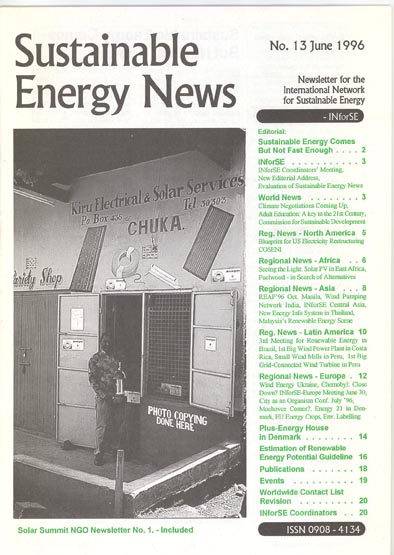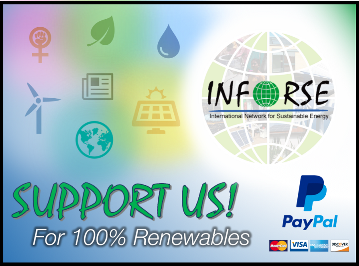|
|
|
|
|
|
|
|
|
|
|
|
|
|
|
|
|
|
|
|
|
| Follow Us: |
| Editorial | |
|
Sustainable Energy is rapidly being introduced in all parts of the world. The March issue of Sustainable Energy News reported on large growths in the installed capacity of wind turbines again in 1995. In this issue, we mention the 8-doubling of the Solar PV production in the period 1980-95. Similar growth rates are found in the use of other sustainable energy technologies: rapid increase in improved cookstoves in Eastern Africa, of biogas in Central Asia, of solar water heaters in Greece and Turkey, of solar cookers in India and Africa, of energy efficiency in Eastern Europe, just to mention a few. With all these successes, do we still need to strengthen NGO- activities for sustainable energy? Do we need to mobilise the forces of the NGOs to further speed up the changes? One answer is that, in spite of the successes with sustainable energy, the energy-related environmental damage is steadily worsening with the ever-increasing emissions. The trend is for further increases in the global emissions, as, e.g., the largest emitter of CO2, USA, will probably not be able to stabilize its emissions, as reported in this issue. Even the environmental movements have changed their focus from stopping global warming to reducing it. As reported in this issue, Climate Action Network will lobby for reductions in greenhouse- gas emissions to stabilize their atmospheric concentrations below the equivalent of 2 times pre-industrial levels of CO2, which would lead to about 2C raise of the global temperature (estimated temperature raise: 1.1 - 3.3 C according to UN Panel of Climate Scientists). A 2 C increase in global average temperature will have some harmful effects to the environment, and thereby to human societies; it is rather a survival strategy than the optimal, environmentally benign solution. Changing from increasing to declining emissions worldwide is technically possible, starting with changes in industrialized countries, which presently have by far the largest share of emissions. In many cases, the changes also have benefits for the society. Unfortunately the technology & market driven introduction of sustainable energy is not fast enough to ensure a sufficient drop in emissions, even though it is fast enough to make sustainable energy business very prosperous. One way to increase the speed of development is to combine the technology and market-driven strategy with bottom-up strategies to integrate the users from all segments of the society into the development and dissemination of sustainable energy solutions. Community-based organizations (CBOs) and other NGOs have large roles to play in implementing these bottom-up strategies. They are already active in many of the above-mentioned successes.Together with the increasing popular understanding of the environmental problems, they are key agents of the necessary changes. Gunnar Boye Olesen |
|

| |
| Published in Sustainable Energy News |
|
|
Go back to main page of ISSUE #13 Sustainable Energy News (16 pages) (1996-06-30) 
|
|
| Contact | |
| |
INFORSE Secretariat Klosterport 4F, 1. floor DK-8000 Aarhus C Denmark Phone: +45 86 22 70 00 Twitter: INFORSE_org Facebook: INFORSE Web: inforse.org E-mail: ove@inforse.org |
